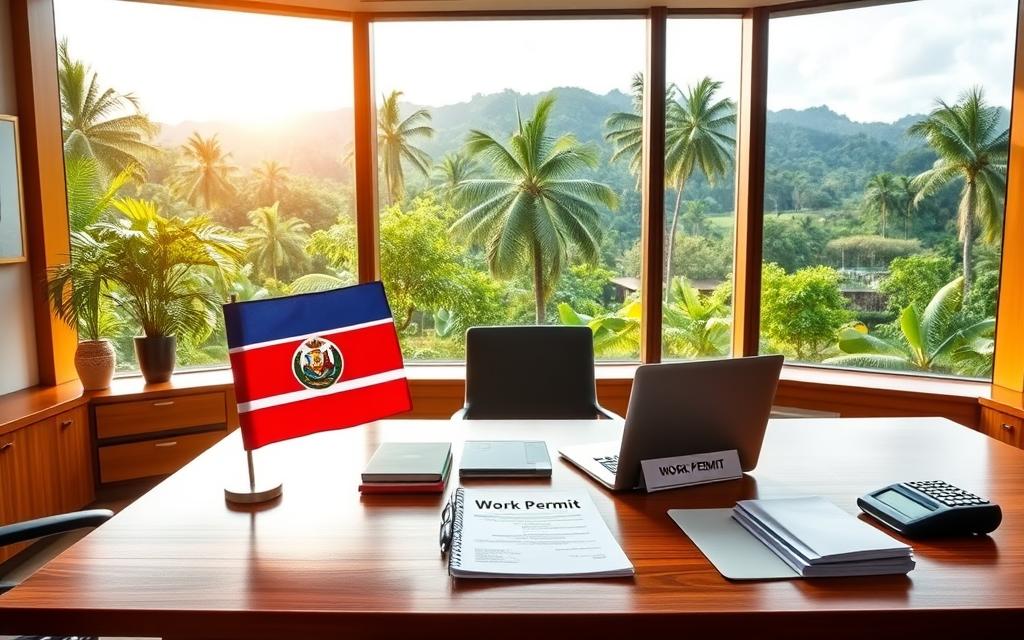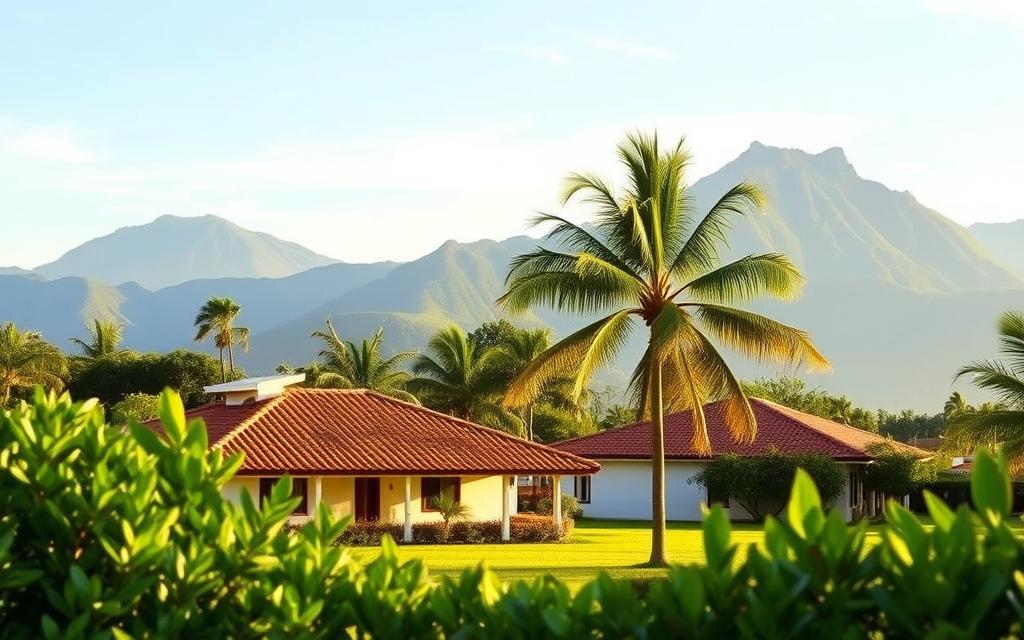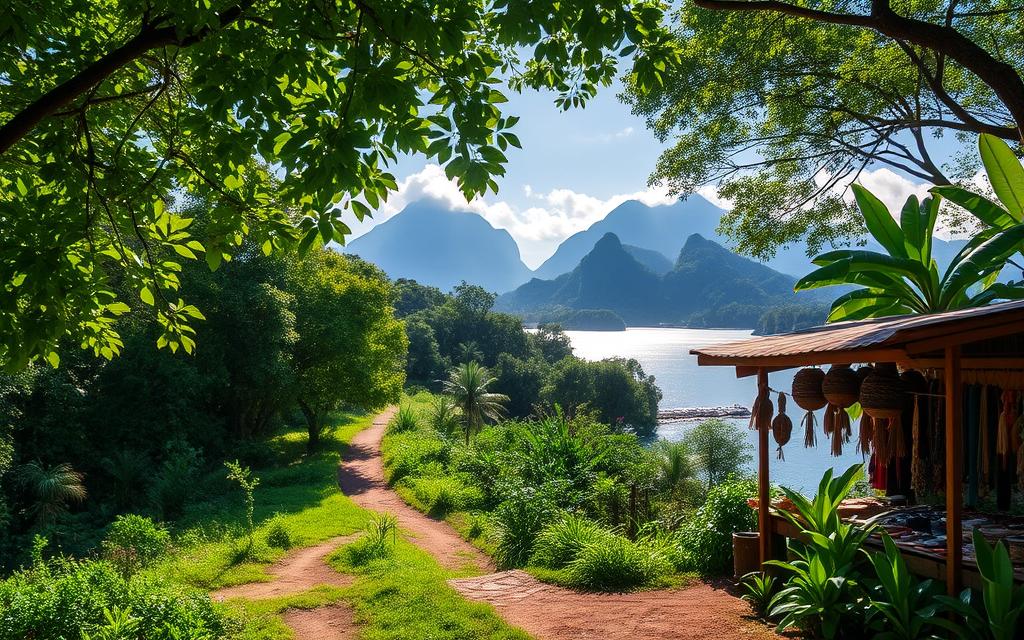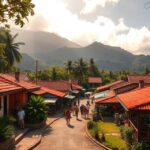Does Costa Rica Allow Work Permits for Foreigners?

Did you know that over 500,000 expats and digital nomads have chosen to call Costa Rica home? This tropical paradise is renowned for its natural beauty, mild climate, and welcoming culture. It’s no wonder so many people are drawn to its vibrant lifestyle and diverse opportunities.
However, navigating the legal requirements to work here can be challenging. Whether you’re seeking temporary or permanent residency, understanding the process is crucial. This guide will walk you through the steps to legally obtain a work permit, highlighting both employer and employee perspectives.
From investor visas to digital nomad options, we’ll explore the pathways available. If you’re considering making the move, residency in Costa Rica could be your gateway to a new chapter. Let’s dive in and uncover what it takes to work legally in this stunning country.
Introduction to Residency Options in Costa Rica

Costa Rica’s residency options open doors to a life filled with natural beauty and cultural richness. For those considering relocation, understanding the available pathways is essential. Whether you’re drawn to its lush landscapes or vibrant communities, this country offers a welcoming environment for individuals and families alike.
Residency in this tropical haven is not just about legal status; it’s about embracing a lifestyle that blends tranquility with opportunity. From temporary permits to permanent solutions, the options cater to diverse needs. Exploring these choices can lead to a smoother transition and a more fulfilling experience.
Why Costa Rica Stands Out
This Central American gem has become a top destination for those seeking a better quality of life. Its stable democracy, affordable healthcare, and emphasis on sustainability make it an attractive choice. Families and remote workers find it particularly appealing due to its safe communities and rich cultural experiences.
The process of obtaining residency involves meeting specific financial and legal requirements. Temporary options often require proof of income or employment, while permanent residency demands a longer commitment. Understanding these differences is key to making informed decisions.
As we delve deeper into the article, we’ll explore the steps involved in the application process. From gathering documents to meeting financial thresholds, we’ll guide you through what to expect. Stay tuned for detailed insights into each residency category and how they align with your goals.
Understanding the Different Types of Costa Rican Residency

Exploring residency options in this tropical haven reveals a variety of pathways tailored to different needs. Whether you’re looking to invest, retire, or simply enjoy a new lifestyle, understanding these options is key. Each category has specific requirements, making it essential to choose the one that aligns with your goals.
Eligibility for Rentista and Investor Residency
The Rentista residency is ideal for individuals with a steady unearned income. Applicants must prove a consistent monthly income of $2,500 for at least two years. This option is perfect for those who don’t plan to work locally but want to enjoy the country’s benefits.
For those willing to contribute to the local economy, the Investor residency is a great choice. A minimum investment of $200,000 in real estate, shares, or projects is required. This pathway not only grants residency but also supports the country’s growth.
Path to Permanent Residency in Costa Rica
Transitioning to permanent residency is possible after holding temporary status for three years. This process involves meeting financial and legal criteria, including proof of income or investment. Permanent residency offers long-term stability and additional rights, such as employment opportunities.
Familial ties can also expedite the process. Spouses and children of citizens or permanent residents may qualify sooner. Understanding these steps ensures a smoother journey toward making this country your permanent home.
Navigating Costa Rica’s Natural and Cultural Appeal

Costa Rica’s blend of natural wonders and vibrant culture creates an ideal setting for families and remote workers. The country’s scenic landscapes, from lush rainforests to pristine beaches, offer a backdrop that inspires creativity and relaxation. Its pleasant climate ensures year-round comfort, making it a top choice for those seeking a balanced lifestyle.
For families, this tropical paradise provides a safe and culturally rich environment. The emphasis on community and sustainability fosters a nurturing atmosphere for children. Schools and healthcare facilities are easily accessible, ensuring peace of mind for parents.
Benefits for Families and Remote Workers
Remote workers find Costa Rica particularly appealing due to its growing digital infrastructure. Reliable internet and coworking spaces support productivity, while the country’s eco-friendly ethos aligns with modern values. The ability to earn a steady income while enjoying an improved quality of life is a significant draw.
Local employment opportunities often complement remote work, offering flexibility for those looking to diversify their income sources. Whether you’re a digital nomad or a family seeking a fresh start, Costa Rica’s welcoming culture and natural beauty make it a compelling choice. For more insights on tax implications for digital nomads, explore our detailed guide.
Does Costa Rica Allow Work Permits for Foreigners?
Navigating the legal landscape for employment in Costa Rica requires a clear understanding of its regulations. While work permits are available, the process is highly regulated and often prioritizes national workers. This ensures that local citizens have access to job opportunities before foreign applicants.
To obtain a permit in Costa Rica, foreigners must meet specific conditions. Employers must first demonstrate that the position cannot be filled by a local worker. This requirement highlights the country’s commitment to supporting its national workforce.
Foreign applicants face several challenges during the application process. Administrative and legal hurdles can extend the timeline, with processing times ranging from three to eight months. Expats often need to provide extensive documentation, including proof of qualifications and insurance.
Despite these challenges, obtaining a visa in Costa Rica is possible for those who meet the criteria. Special categories, such as temporary worker or self-employed specific occupation worker, offer pathways for foreign professionals. Understanding these options can help streamline the process.
In summary, while the system favors national workers, foreigners can successfully secure permits under the right conditions. By preparing thoroughly and meeting all requirements, expats can navigate the process more effectively.
Exploring Work Permit Options in Costa Rica
Professionals seeking employment opportunities here can explore specialized permit categories designed for their expertise. Whether you’re an artist, athlete, or technical expert, there are tailored solutions to meet your needs. Understanding these options ensures a smoother application process and better alignment with your career goals.
Special Category Permits for Specific Occupations
Special category permits are designed for unique professions that require specific skills. These include roles in arts, sports, and technical fields. Employers must demonstrate that the position cannot be filled by a local worker, ensuring that these permits are reserved for highly specialized talent.
Applicants must provide proof of qualifications, such as certifications or professional licenses. Additionally, a letter of intent from the employer is required to initiate the process. This pathway is ideal for professionals who bring unique expertise to the local economy.
Temporary Work Permit Steps and Requirements
Obtaining a temporary work visa involves several steps. First, the employer must register with the relevant authorities and prove the need for a foreign worker. Next, the applicant submits documents, including a passport, birth certificate, and proof of qualifications.
The application process can take up to eight months, depending on the complexity of the case. Fees vary, with initial costs around $50 and additional charges totaling up to $300. Both the employer and employee play crucial roles in ensuring the application is complete and accurate.
Failure to follow the correct protocol can result in delays or rejection. It’s essential to double-check all documents and meet deadlines to avoid complications. By understanding these steps, professionals can navigate the process more effectively.
Key Visa Types for Working in Costa Rica
Understanding the various visa options for employment in this tropical destination is essential for a smooth transition. Whether you’re a professional, investor, or digital nomad, there’s a visa type tailored to your needs. Let’s explore the categories available and their unique benefits.
Overview of Visa Categories Available
Temporary work visas are ideal for short-term employment, lasting up to two years. These are often used by professionals in specialized fields like arts, sports, or technical roles. Employers must prove that the position cannot be filled locally, ensuring these visas are reserved for unique talent.
Permanent residency permits, on the other hand, offer long-term stability. After holding temporary status for three years, individuals can apply for permanent residency. This option provides unrestricted employment opportunities and eliminates the need for frequent renewals.
For digital nomads, the Digital Nomad Visa is a popular choice. It requires proof of a steady income, with a minimum of $3,000 per month for individuals. This visa is valid for one year and can be extended, making it perfect for remote workers.
Investors can opt for the Investor Visa, which requires a minimum investment of $200,000 in local businesses or properties. This pathway not only grants residency but also supports the local economy. Each visa type has specific eligibility requirements and processing times, so choosing the right one is crucial.
For more details on the legal requirements for residency, visit our comprehensive guide. By understanding these options, you can make an informed decision that aligns with your career and lifestyle goals.
Essential Documentation for Work Permit Applications
Proper documentation is crucial for a smooth work permit application process. Ensuring all required paperwork is complete, notarized, and translated into Spanish can prevent delays and complications. Let’s explore the essential documents you’ll need to prepare.
Complete Documentation Checklist
To apply for a work permit, you’ll need a valid passport with at least six months of validity. A birth certificate is also required, and it must be authenticated and translated into Spanish. Additionally, a police clearance certificate from your home country or any place you’ve lived in the last three years is mandatory.
Notarization is a critical step for many documents. Ensure that your birth certificate, police clearance, and any other required paperwork are notarized by a certified authority. Translations must be done by a professional translator and include a certification of accuracy.
Other essential items include two recent passport-sized photographs and a letter from your employer justifying your role. Financial proof from the employer, such as bank statements or tax returns, may also be required. Double-check with the local consulate to confirm all documents meet their specific requirements.
Organizing your paperwork is key to a streamlined process. Create a checklist and keep all documents in a secure folder. Label each item clearly and ensure copies are made for your records. This preparation will save time and reduce stress during the application process.
Step-by-Step Guide to the Application Process
The journey to obtaining a work permit is a multi-step process that requires careful planning. From the initial application to the final approval, each stage has specific requirements and timelines. Let’s break down the process to help you navigate it with confidence.
From Provisional Visa to Work Permit Acquisition
The first step is applying for a provisional visa through a consulate. This involves submitting essential documents, such as your passport, birth certificate, and proof of income. Processing times for this stage typically take one to two months, depending on the consulate’s workload.
Once you arrive, you’ll need to register with local authorities. This includes fingerprinting and submitting additional paperwork. This step usually takes about a month to complete. It’s crucial to ensure all documents are notarized and translated into Spanish to avoid delays.
After registration, the next phase is the work permit application. This involves submitting your employment contract, proof of qualifications, and other required documents. Processing times for this stage can range from three to eight months. Maintaining active communication with immigration officials is key to staying updated on your application’s status.
Follow-up procedures, such as interviews or additional document requests, may occur during the process. Being prepared and responsive can help expedite the timeline. For more detailed guidance, check out our guide on residency in Costa Rica.
By understanding each step and preparing thoroughly, you can navigate the process more effectively. Patience and attention to detail are essential for a successful outcome.
Employer Responsibilities and Labor Market Considerations
Employers in this Central American country face specific responsibilities when hiring international talent. The process involves strict adherence to local labor laws and thorough documentation. Companies must ensure they meet all legal requirements to avoid penalties and delays.
Labor Market Test Requirements
Before hiring a foreign worker, employers must prove that no qualified local candidates are available. This involves conducting a labor market test and submitting evidence to the relevant authorities. The test ensures that the company prioritizes national workers while filling specialized roles with international talent.
Employers must also provide detailed job descriptions and proof of efforts to recruit locally. This step is crucial for demonstrating the necessity of hiring a foreign worker. Companies should maintain records of all recruitment activities to support their case.
Employer Registration and Compliance
Registering with local authorities is a mandatory step for companies hiring foreign workers. This process includes submitting company details, proof of legal operation, and financial statements. Proper registration ensures that the employer complies with labor standards and avoids legal issues.
Compliance with labor laws is equally important. Employers must adhere to regulations on working hours, wages, and benefits. For example, standard work hours are capped at 8 hours per day, and overtime must be paid at 150% of the regular rate. Non-compliance can result in fines or other penalties.
Additionally, companies must assist foreign workers with the documentation required for work permits. This includes providing employment contracts, proof of qualifications, and financial statements. Employers play a key role in ensuring a smooth application process for their international hires.
Navigating the sponsorship process can be challenging, but preparation is key. Companies should stay informed about legal updates and seek professional guidance when needed. For more details on how to employ foreigners, explore our comprehensive guide.
Understanding Costa Rica's Immigration Laws and Regulations
Understanding the legal requirements for foreign workers is essential for a successful transition to working in this country. The immigration framework is designed to balance national interests with the need for international talent. Compliance with these laws ensures a smooth application process and avoids potential penalties.
Key Legal Requirements for Foreign Workers
Foreign workers must meet specific criteria to be eligible for employment opportunities. Proof of qualifications, such as certifications or professional licenses, is mandatory. Employers must also demonstrate that the position cannot be filled by a local citizen, ensuring national labor priorities are upheld.
The application process involves submitting documents like a valid passport, birth certificate, and police clearance. These must be notarized and translated into Spanish. Failure to provide accurate documentation can result in delays or rejection.
National preferences play a significant role in the immigration framework. Employers are required to conduct a labor market test to prove the necessity of hiring foreign talent. This ensures that local workers are prioritized while allowing specialized roles to be filled by international professionals.
Understanding the potential costs associated with the legal process is also crucial. Application fees, notarization, and translation services can add up. Noncompliance with regulations may lead to fines or other penalties, making it essential to adhere to all requirements.
By familiarizing yourself with these laws, you can navigate the process more effectively. Compliance not only ensures a successful application but also supports the country’s commitment to balancing national and international labor needs.
Costs, Fees, and Processing Times for Work Permits in Costa Rica
Securing a work permit involves understanding the associated costs and timelines. The application process requires careful planning to account for fees, processing durations, and potential additional expenses. Let’s break down what you need to know to budget effectively and navigate the process smoothly.
Breakdown of Application Fees and Timelines
The initial application fee for a work permit is approximately $52. This non-refundable fee covers the basic processing costs. Additional expenses may arise, such as notarization and translation services, which are essential for submitting accurate documentation.
Processing times can vary significantly, often taking between three to eight months. Factors such as the complexity of your case and the workload of immigration authorities can influence the timeline. It’s important to start the process early to avoid delays in your employment plans.
Other costs to consider include the departure tax, which is around $28-29 for foreign nationals leaving the country. Additionally, travelers must show proof of sufficient funds, such as access to at least $300 upon arrival. These financial requirements ensure you can support yourself during your stay.
For those extending their stay, a tourist visa can be renewed for an additional 60 days by applying at the Directorate General of Immigration. This extension comes with its own set of fees and documentation requirements. Planning ahead and budgeting for these expenses will help you avoid last-minute stress.
Understanding the full scope of costs and timelines is crucial for a successful application. For more detailed guidance on navigating the process, check out our guide on residency in Costa Rica.
Challenges and Expert Tips for Securing a Work Permit
Securing a job in this tropical destination comes with its own set of challenges. The process of obtaining legal authorization to work here can be complex, with strict eligibility criteria and long waiting times. Understanding these obstacles and preparing thoroughly can make a significant difference in your application success.
Common Obstacles in the Application Process
One of the most common hurdles is proving job suitability. Employers must demonstrate that the position cannot be filled by a local worker, which often requires extensive documentation. Additionally, meeting specific type work criteria can be challenging, especially for specialized roles.
Delays are another frequent issue, with processing times sometimes lasting up to a year. These delays can be frustrating, but proper preparation can help minimize them. Ensuring all documents are complete, notarized, and translated into Spanish is crucial.
Expert Tips to Overcome Challenges
To improve your chances of approval, start by gathering all required documents early. Double-check that everything is accurate and meets the legal requirements. Consulting with an immigration expert can also provide valuable insights and streamline the process.
Another effective strategy is to maintain open communication with your employer and immigration authorities. Staying informed about your application status can help you address any issues promptly. Finally, be patient and persistent, as the process often requires time and effort.
By understanding the challenges and following these expert tips, you can navigate the application process more effectively. Careful planning and professional guidance are key to securing your work permit and starting your new job in this beautiful region.
Leveraging Digital Nomad Visas for Remote Work Opportunities
Remote work has transformed how professionals approach their careers, and Costa Rica’s digital nomad visa is a game-changer. This visa allows remote workers to live and work in this tropical paradise while enjoying its natural beauty and vibrant culture. With its growing popularity, this program is an excellent option for those seeking flexibility and adventure.
Requirements for the Digital Nomad Visa
To qualify for this visa, applicants must meet specific criteria. A stable monthly income of at least $3,000 for individuals or $4,000 for those with dependents is required. Proof of income, such as bank statements or employment contracts, must be submitted as part of the application.
Health insurance is another essential requirement. Applicants must provide a certificate of coverage that meets local standards. This ensures that digital nomads have access to healthcare during their stay. Additionally, a valid passport and a clean criminal record are mandatory.
The application process involves submitting a completed form, proof of income, and a certificate of insurance. A $100 fee is required, and processing typically takes 15 days. Once approved, the visa is valid for one year, with the option to renew for an additional year.
Benefits of the Digital Nomad Visa
This visa offers numerous advantages for remote workers. It provides the freedom to work from a stunning location while enjoying tax exemptions on foreign-earned income. The program also supports a healthy work-life balance, with opportunities to explore Costa Rica’s natural wonders.
For those considering this option, our step-by-step guide simplifies the application process. From gathering documents to submitting your application, we’ll walk you through each step. With the right preparation, securing a digital nomad visa can be a seamless experience.
Balancing Residency Benefits with Work Authorization Flexibility
Understanding the balance between residency benefits and work flexibility is key to making informed decisions. Different programs offer unique advantages, but aligning them with your career goals is essential. Let’s explore how to evaluate these options effectively.
Evaluating Pros and Cons for Your Situation
Residency programs vary in their impact on employment rights. Some categories allow full work authorization, while others restrict employment opportunities. For instance, the Rentista program requires a stable income but doesn’t permit local employment. On the other hand, the Investor category offers both residency and the ability to engage in business activities.
Investors can benefit from programs that require a minimum investment of $200,000. This not only grants residency but also opens doors to local business opportunities. However, those seeking simpler solutions might opt for temporary permits, which are easier to obtain but offer limited long-term benefits.
When choosing a category, consider your professional and personal needs. For example, digital nomads may prefer the Digital Nomad Visa, which provides flexibility without requiring local employment. Families, however, might prioritize permanent residency for long-term stability and access to education and healthcare.
It’s also important to weigh the costs and processing times. Temporary permits are often quicker to secure but may require frequent renewals. Permanent residency, while more time-consuming, offers greater freedom and fewer restrictions.
By carefully evaluating these factors, you can select the option that best aligns with your goals. Whether you’re an investor, remote worker, or family, understanding the nuances of each program ensures a smoother transition and a more fulfilling experience.
Planning Your Move: Preparation and Next Steps for Success
Preparing for your move to this tropical destination requires careful planning and attention to detail. Early preparation ensures a smooth transition and helps avoid unnecessary delays. By organizing your paperwork and connecting with local authorities, you can set yourself up for success.
Secure Your Documentation in Advance
Gathering all necessary documents is the first step in your relocation process. Start by collecting your passport, birth certificate, and police clearance. Ensure these documents are notarized and translated into Spanish to meet local requirements.
Proof of income or financial stability is also essential. This includes bank statements, employment contracts, or pension details. Having these ready early can save time and prevent last-minute stress.
Engage with Local Authorities and Consulates
Connecting with local authorities and consulates is crucial for a smooth transition. Reach out to the nearest consulate to understand specific requirements for your situation. They can provide valuable guidance and help clarify any doubts.
Establishing contact with local authorities before your arrival can also streamline the process. This includes registering with immigration offices and understanding local labor laws. For more detailed guidance, explore our DIMEX Costa Rica guide.
By following these steps, you can ensure a successful move and focus on enjoying your new life in this beautiful region. Proper preparation and engagement with local officials are key to a seamless transition.
Conclusion
Navigating the process of securing legal authorization in this vibrant country requires careful planning and understanding of its policies. Throughout this guide, we’ve explored the various pathways to residency and the requirements for obtaining a work permit. Thorough preparation, accurate documentation, and compliance with local laws are essential for success.
Understanding the nuances of immigration policies can help you avoid common challenges. Consulting with experts and local authorities ensures you stay informed and meet all legal obligations. Whether you’re pursuing temporary or permanent options, aligning your goals with the right program is key.
We encourage you to take the next steps confidently, armed with the knowledge to make informed decisions. By planning ahead and seeking professional guidance, you can embark on your journey toward a fulfilling life in this beautiful region.


